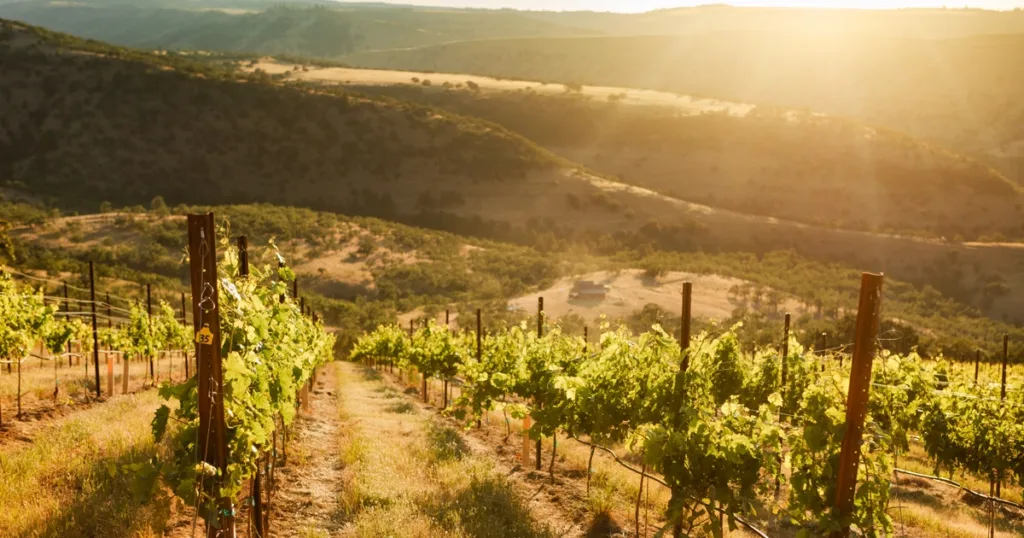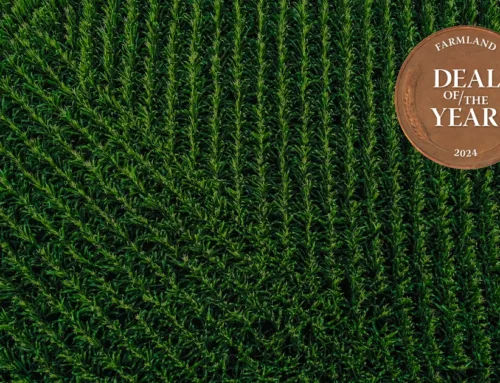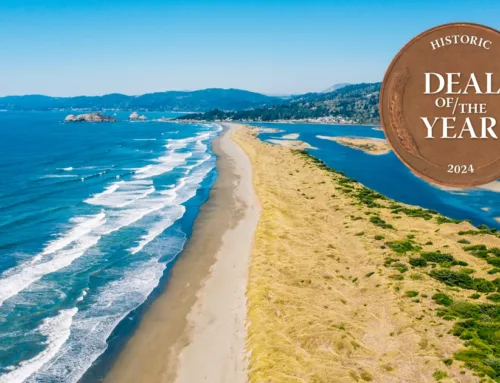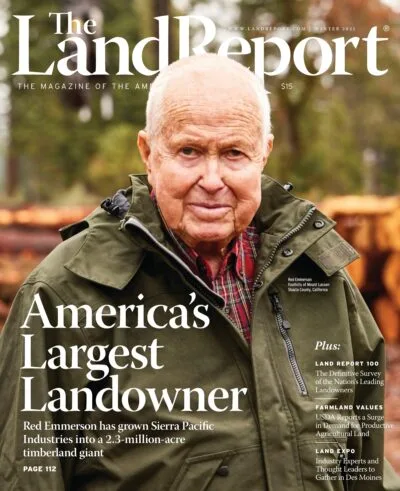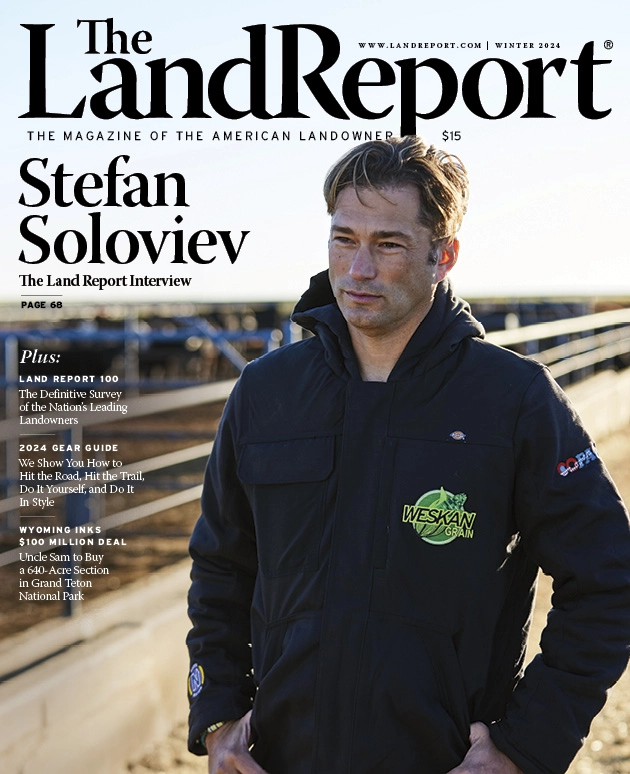The Capital Call Story
The Capital Call Story
By Drew Beard
Photography By Mark VanDonge
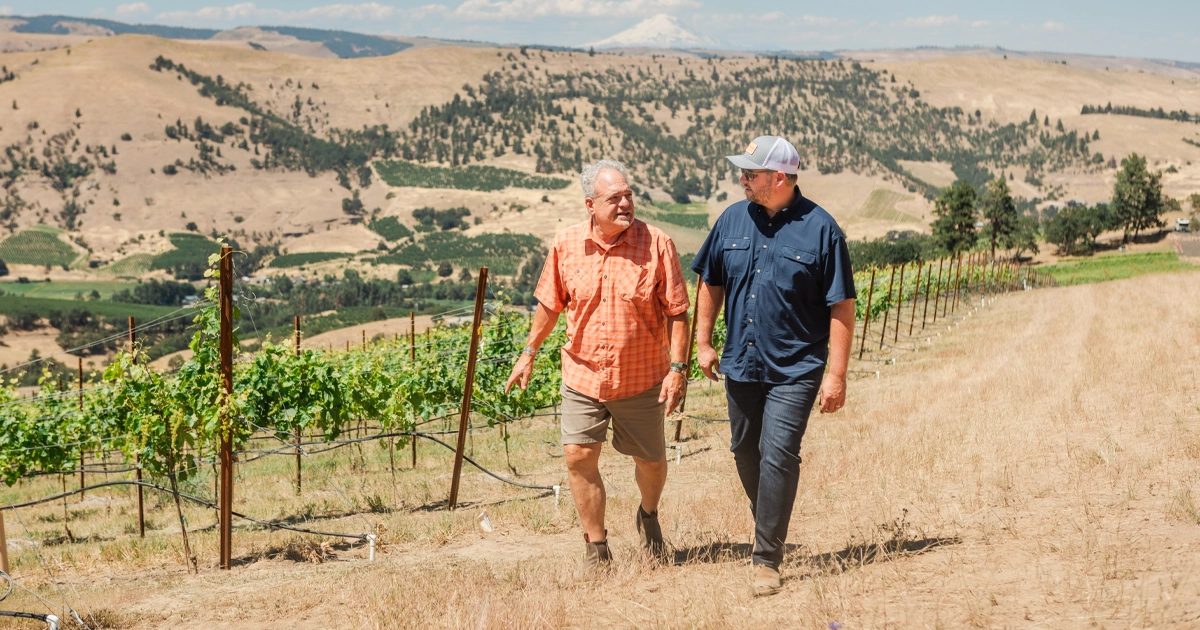
LR_CapitalCall-01
THE PARTNERS. Alan Busacca and Steve Bruere tour Windhorse, their Oregon vineyard.
Steve Bruere remembers well the fateful phone call.
Alan Busacca, his partner in Windhorse Vineyard, was on the line. The business needed a quick cash infusion. The two had spoken the day before. On that call, Steve had brought up the fact that harvest at their vineyard was running below expectations. The way things were looking, the vineyard was going to run in the red that year. “I don’t think we’re making any money,” he remembered telling his partner.
When Alan called the very next day dialing for dollars, Steve’s answer was tinged with exasperation. “Alan, are you calling for money again?” he asked.
“In fact, I am,” Alan said.
“The only thing this wine business is good for is capital calls,” Steve replied. It was a lightbulb moment for both of them. Neither could believe that no one had ever named a wine Capital Call.
Weidert Farm
Three years earlier, at the 2016 Land Investment Expo in Des Moines, Iowa, Steve had met Tim and Jennifer Weidert. The couple was looking to sell 6,000 acres of superior farm ground in Eastern Washington’s Walla Walla Valley and reinvest the proceeds in the Midwest.
An Iowa farm boy himself, Steve understood the appeal. He had been in the real estate business since 2003, specializing in farmland management, appraisal, and brokerage. His company, Peoples Company, had gone from serving a few counties in Central Iowa to a nationwide network of offices. He didn’t know it then, but the Weiderts would help him add “vintner” to his resume.
“Weidert Farm was a dryland asset, a wheat farm with excellent water rights. But its best use was as a vineyard,” Steve recalls. “I had never been to Washington. I knew nothing about vineyards. But the next thing you know I’m marketing this unique asset in the Walla Walla Valley. I really had to become a student of vineyards and the wine business to know how best to market and sell this asset.”
As part of his pre-sale preparation, Steve realized he needed an expert on vineyards and soil science to help him market the property. That’s how he met Alan, the same Alan that kept calling for money a few years later.
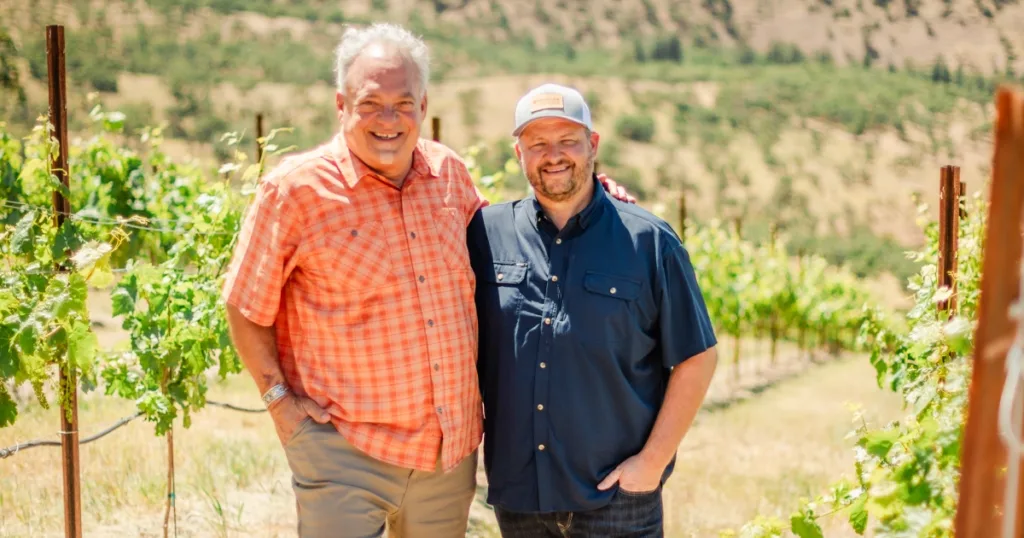
Dr. Dirt
“Alan calls himself Dr. Dirt,” Steve says. It’s a title the California native has earned over decades in the wine industry, first as a professor of soil science and geology at Washington State University and, since 2006, through his company, Vinitas Vineyard Consultants.
“He was the perfect resource,” Steve says. “His research in 2000 on the terroir of the Walla Walla Valley American Viticulture Area (AVA) helped to put Walla Walla winemakers on the wine world’s radar. He had already assisted with the creation of almost half of the state’s AVAs at the time, and his studies had resulted in more than 5,000 acres of new vineyards.”
Together, the two sold Weidert Farm and became fast friends. Alan saw Steve’s budding passion for wine and decided to pitch him on a partnership in Windhorse, a vineyard he owned in Oregon’s Columbia Gorge AVA.
“I went up on the vineyard. It was the first time I had seen it, but the views of Mount Hood and Mount Adams and the Columbia River were stunning. It was a beautiful property. I just closed my eyes and said, ‘I’m in,’” Steve says.
At the time of the partnership, Steve’s mindset was more investment oriented. “It was a real estate play with some great tax benefits, first and foremost,” he says. “The wine was secondary to me then.” But the seed had already been planted.
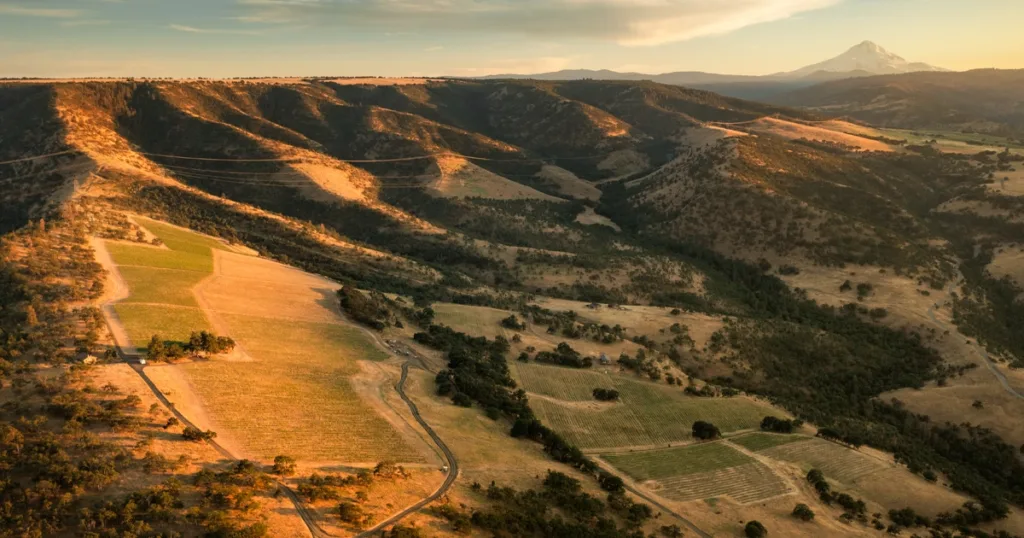
Creating Capital Call
Alan had yet to produce an estate wine at Windhorse. Instead, he sold his fruit to other winemakers. In 2017, he and Steve made a small amount of wine from the Windhorse Vineyard. “We weren’t going to sell it,” Alan says. “We just planned to serve it at holiday parties and business dinners and give it as gifts.”
Their wine didn’t have a name. But when Alan called asking for more money, Capital Call was born. The name had a clear business connotation, which Steve, in particular, appreciated. “At business dinners, whether you’re celebrating good news or delivering bad news, there’s often times a bottle of good wine involved,” he says.
But more than that it embodied the well-worn adage that Steve and Alan were learning all too well: to make a small fortune in the wine business, you’ve got to start with a large one. And they agreed to continue to invest in creating a world class vineyard that could produce amazing wines.
Adding Wheatfield Vines
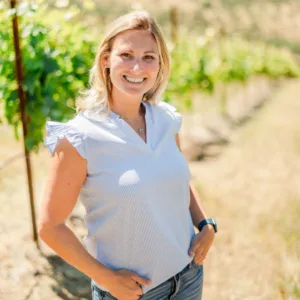 In 2020, Steve more than doubled their acreage under vine with the purchase of a second estate vineyard, Wheatfield Vines in the Walla Walla Valley, not far from Weidert Farm, the deal that introduced him to the wine world three years prior and where he now has a real estate office serving the region.
In 2020, Steve more than doubled their acreage under vine with the purchase of a second estate vineyard, Wheatfield Vines in the Walla Walla Valley, not far from Weidert Farm, the deal that introduced him to the wine world three years prior and where he now has a real estate office serving the region.
“I’m in love with both vineyards,” says Steve. “Wheatfield is a warmer site, so you can grow big reds like Cabernet and Merlot, but it’s more of a valley floor site with beautiful views of the mountains and the wheat fields around it. Windhorse sits at an extremely high elevation with very steep slopes. You get winemakers up there, and they start geeking out over the site.”
At first, Nikki Bruere (above) wasn’t sold on her husband’s new obsession with vineyards. But she has since played an instrumental role in the formation of Capital Call. “She started joining me on some of my business trips to the Pacific Northwest and fell in love with the area just like me,” Steve says. “She started participating in blending trials and designing labels and ended up pushing us to pursue opening a tasting room.”
Returning to Farmland Roots
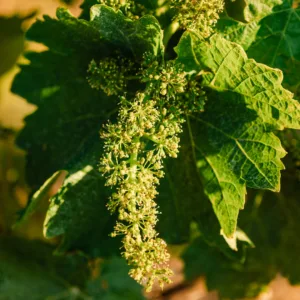 While Steve enjoys winemaking, too, the agricultural component is what he’s most passionate about. Perhaps it’s his Iowa farm boy roots or maybe all the time he spent studying vineyards while marketing Weidert Farm, but Steve is as infatuated with soil as he is with the grapes it grows. The vineyards are a perfect reflection of the tried-and-true business adage that he’s embraced throughout his entire career: location, location, location.
While Steve enjoys winemaking, too, the agricultural component is what he’s most passionate about. Perhaps it’s his Iowa farm boy roots or maybe all the time he spent studying vineyards while marketing Weidert Farm, but Steve is as infatuated with soil as he is with the grapes it grows. The vineyards are a perfect reflection of the tried-and-true business adage that he’s embraced throughout his entire career: location, location, location.
“It all comes back to the soil and the farming,” he says. “A few years ago, we were tasting three different Syrahs, the same clones produced the same way. The only difference was where the grape was grown, and they each tasted completely different. When you start to internalize that, especially for a farmland guy, that’s eye opening.”
Steve became fascinated by Alan’s work determining the best grape to be paired with the ideal growing site. “There is so much that goes into it, including the slope, aspect, elevation, growing degree units, wind, soils, and more. When you pair a great site with great farming and the right grape varieties, you have the foundation for amazing wines,” he says.
Understanding Terroir
Steve and Nikki Bruere view the art of winemaking as equally important to the terroir, and that’s why they rely on some of the best in the industry, including winemaker Josh Maloney, whom they entrust to produce Capital Call. Josh’s wines have earned 90-plus points from leading wine critics more than 70 times over the last 20 years.
The first vintage of Capital Call, a Cabernet Sauvignon from 2019, was a hit among friends and business associates. “I gave it as gifts and took it to business dinners,” Steve recalls. Naturally, those dinners often led to requests to order more wine.
In 2022, Steve, Nikki, and Alan began selling Capital Call online and through select restaurants and wine bars. They watched with excitement as complete strangers purchased their wines. Businesspeople were drawn to the name as were those in the wine business. In Steve’s words, “If you know, you know. The name doesn’t really need any explanation,” he says.
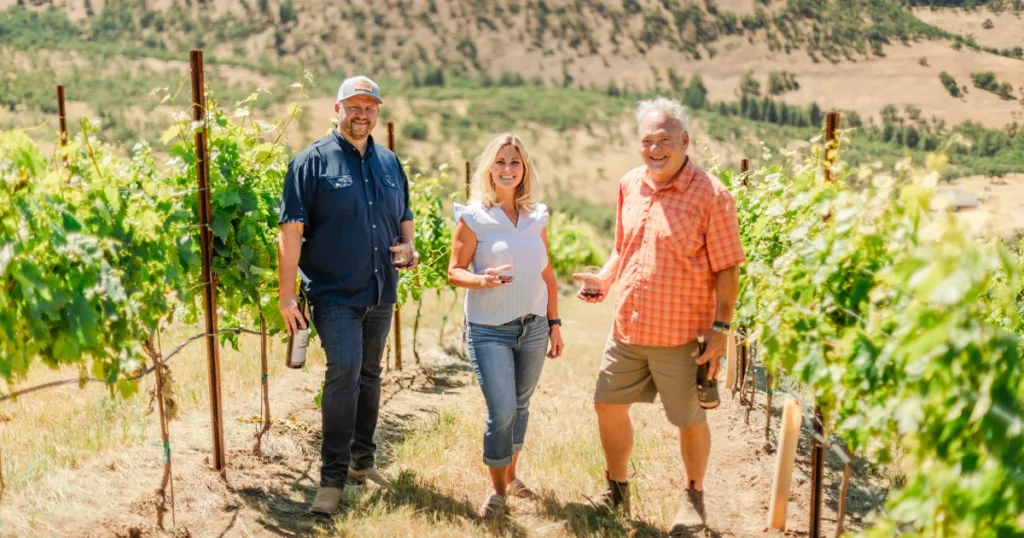
Marketing Nine Different Labels
By 2024, they had nine different labels across both estate vineyards. Not surprisingly, it was time for another capital call. This time it was for a brick-and-mortar tasting room in downtown Walla Walla. “We’ve come full circle from growing a few grapes to making enough wine for national sales and a dedicated tasting room,” Steve says. “What we want to do with our new location in Walla Walla is tell our story. Those different labels help us do that.”
That story features Capital Call Cabernet Sauvignon as the flagship brand. Two other financial-themed offerings — Margin Call and Cashflow — target by-the-glass sales. Windhorse Vineyard, the plot of land that started it all for Steve, has its own line of estate wines. Long Cork Merlot, a tongue-in-cheek reference to the long running debate over the ideal cork type, is a testament to the lighthearted approach Capital Call has taken to winemaking. “There can be a lot of pretension in the wine industry,” Steve says. “Long Cork is our way of poking fun at that.”
The Dr. Dirt label stands out in the lineup as a tribute to Alan. Over the years, his tireless efforts have helped nurture the wine industries in Washington and Oregon as well as paving the way for Capital Call Vintners. “It was Alan’s passion that first inspired me to purchase a vineyard and get into winemaking,” says Steve. “Our shared love of land is what made all this possible. It’s what I hope shines through in each bottle,” Steve says.
This shared vision is the essence of their partnership. “We’re not retired billionaires who decided to make wine. There are farming roots and a real passion for the land behind what we’re doing,” Steve tells me with pride. “Think about the long-term commitment of selecting a site and planting the grapes and getting it into a bottle. All that vision, hard work, effort, and capital. And then, after years of patience, you get to share it with friends and share the story behind the wine. That’s what this business is all about.”
